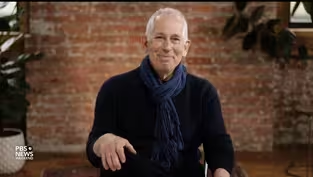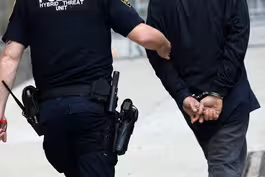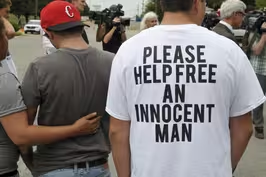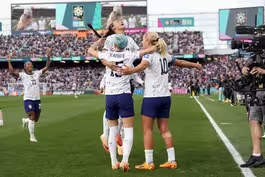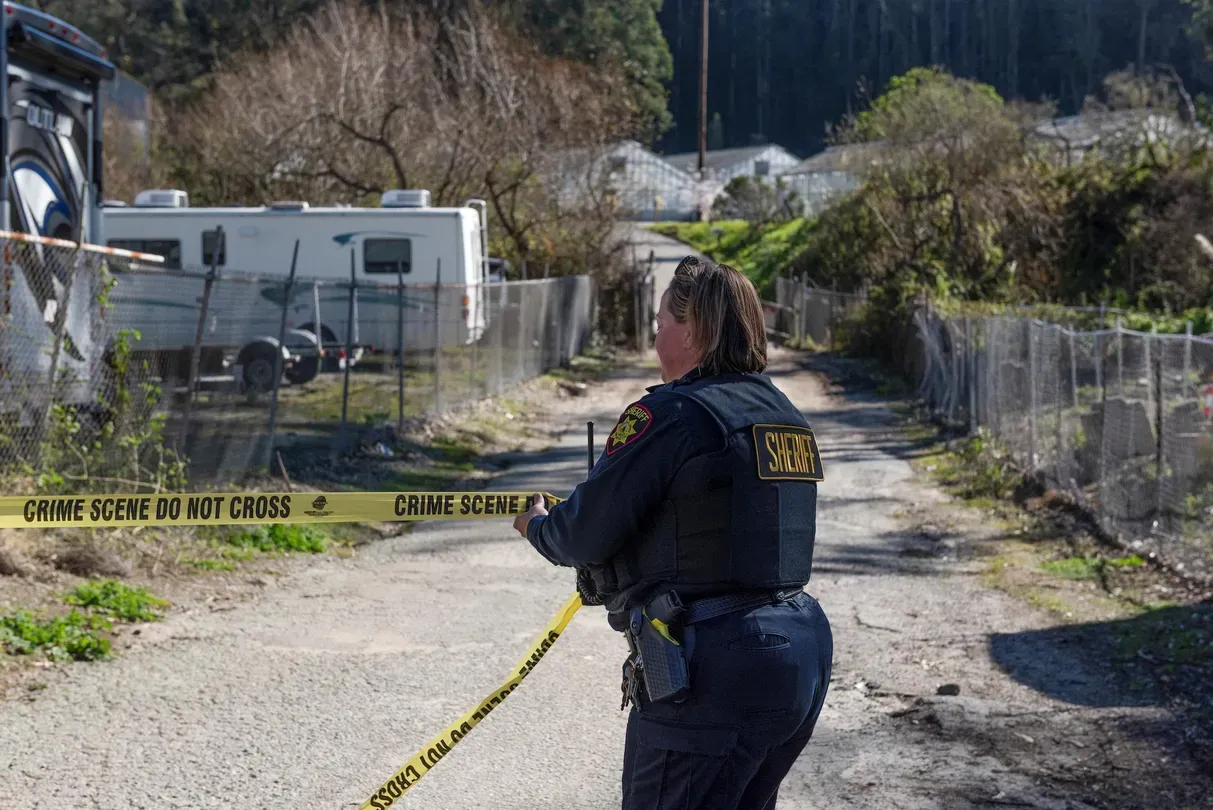

July 22, 2023 - PBS News Weekend full episode
7/22/2023 | 26m 45sVideo has Closed Captions
July 22, 2023 - PBS News Weekend full episode
Saturday on PBS News Weekend, a new report looks at the state of crime in America and best practices for curbing it. With the Women’s World Cup underway, we look at efforts worldwide to achieve equity in soccer. An Oklahoma death row prisoner’s case reignites the debate over capital punishment. Plus, a disability advocate’s Brief But Spectacular take on learning differently.
Problems playing video? | Closed Captioning Feedback
Problems playing video? | Closed Captioning Feedback
Major corporate funding for the PBS News Hour is provided by BDO, BNSF, Consumer Cellular, American Cruise Lines, and Raymond James. Funding for the PBS NewsHour Weekend is provided by...

July 22, 2023 - PBS News Weekend full episode
7/22/2023 | 26m 45sVideo has Closed Captions
Saturday on PBS News Weekend, a new report looks at the state of crime in America and best practices for curbing it. With the Women’s World Cup underway, we look at efforts worldwide to achieve equity in soccer. An Oklahoma death row prisoner’s case reignites the debate over capital punishment. Plus, a disability advocate’s Brief But Spectacular take on learning differently.
Problems playing video? | Closed Captioning Feedback
How to Watch PBS News Hour
PBS News Hour is available to stream on pbs.org and the free PBS App, available on iPhone, Apple TV, Android TV, Android smartphones, Amazon Fire TV, Amazon Fire Tablet, Roku, Samsung Smart TV, and Vizio.
Providing Support for PBS.org
Learn Moreabout PBS online sponsorshipJOHN YANG: Tonight on PBS News Weekend, a new report looks at the state of crime in America and the best practices for curbing it.
THADDEUS JOHNSON, Senior Fellow, Council on Criminal Justice: It involves police and communities working together, particularly our communities our most vulnerable.
JOHN YANG: Then with Women's World Cup underway, we look at efforts worldwide to achieve equity in the sport.
And an Oklahoma death row inmate's case reignites the debate over capital punishment.
(BREAK) JOHN YANG: Good evening, I'm John Yang.
The summer of 2023 has become the summer of superlatives.
Scientists say the first two weeks of July were the Earth's hottest on human record.
In the southwestern United States, Phoenix has never been this hot for this long, and the heat has spread to places like Boise, Idaho, where today's high is forecast to be above 100 degrees.
Across the southeast, a new wave of heat and humidity will make it feel as hot as 115 degrees in some places.
More than 90 million Americans are under heat alerts.
And in Europe, Greek firefighters are battling dozens of wildfires as an intensifying heatwave stretching from Spain to Greece is setting records there.
Ukrainian officials say its drones hit an ammunition depot early today in the illegally annexed Crimean peninsula.
It forced evacuations and the brief closure of a key bridge connecting Crimea and the Russian mainland.
It was the latest in a series of aerial assaults from both sides.
It began Monday when Ukraine blew up two sections of that 12 mile long bridge, which is a crucial Russian supply line.
Two people were killed.
Then came days of deadly Russian barrages against Ukrainian ports.
Moscow pulled out of a deal to allow safe passage through the Black Sea of ships carrying Ukrainian grain, which is crucial to the world's food supply.
And the U.S. women's soccer team beat Vietnam three nil in its first game of this year's World Cup.
Forwards Sofia Smith had two goals and an assist in her first World Cup game.
And in its first World Cup game, Haiti narrowly lost the European champion England, one nil.
Haiti qualified for the first time this year despite not having any sponsors or playing any home games because of the turmoil and violence there.
Still to come on PBS News Weekend, pay equity and the Women's World Cup and a disabilities advocate Brief But Spectacular take on learning differently.
(BREAK) JOHN YANG: As the COVID-19 pandemic spread across the country, crime rates surged to highs not seen in decades.
But now crime trends appear to be shifting.
Ali Rogin has the latest on what new research says about the state of crime in America and the best practices for curving it.
ALI ROGIN: A new report from the Council on Criminal Justice provides new insight on crime levels for the first half of this year.
Data from 37 cities shows that most crime has gone down compared to last year, but levels are still higher since before the pandemic.
The most notable exception is a large increase in motor vehicle theft.
At the same time the number of homicides dropped sharply over 9 percent lower than the first half of 2022.
Adam Gelb is the founder, president and CEO of the Council on Criminal Justice, which is a nonprofit Think Tank focusing on criminal justice reform.
And Thaddeus Johnson is a Senior Research Fellow for Council on Criminal Justice who studies policing, crime control and governance equity.
Thank you both so much for joining me.
Adam, let's start with you.
Walk us through some of the main findings of this report.
ADAM GELB, President and CEO, Council on Criminal Justice: Sure, the headlines here are that we have a significant decrease in homicide 9 percent.
It would be historic if it stays that way throughout the year, and then a significant increase in motor vehicle theft.
The rest of the crimes are pretty flat, trending downwards, downwards somewhat slightly.
And we do still see unfortunately, elevated levels of homicide and violent crimes in particular.
And with respect to all of that the actual doubling of the rate of auto theft today compared to 2019.
ALI ROGIN: What are the factors behind that?
ADAM GELB: Yeah, but this is one of the most interesting things about what's happened over the last couple of years.
You know, it takes three things to have a crime, you've got motive, means and opportunity.
Here with a motor vehicle theft, it really highlights the role that opportunity plays.
And that is, particularly with two types of models of cars, Hyundais and Kias became a lot easier to steal.
And there was a TikTok video that showed you how to do that, but a very simple way.
And so all of a sudden, we see this significant rise in auto theft, not because people have different reasons for doing it.
But it's just easier to do.
ALI ROGIN: Thaddeus, I want to talk to you about crime reduction methods.
What are some of the proven methods that you have seen in some of these communities that really work?
And how much can we attribute these declines in the cities that this report looked at to those crime reduction methods?
THADDEUS JOHNSON: That's the billion dollar question, right.
And it's difficult to really pinpoint the exact causes of the crime trends.
But at a fundamental level, we can think about the pandemic and the associated shutdowns, they disrupted the way police and service providers were able to engage and serve our communities, especially those at greatest risk of community violence.
And so one key strategy has been focusing on the small number of people and places where violent crime is concentrated.
For instance, the report showed that in Philadelphia that 1 percent of the population was responsible for about 60 or 70 percent of the crimes.
And so police are turned away from the stop and frisk type of policing.
And they've turned to a more intelligence driven policing that draws on police intelligence, crime mapping, risk terrain mapping, says social network analysis that identify these people does not just police, it's not just communities, we need each other.
And the most effective strategies are the ones that really emphasize that relationship.
ALI ROGIN: I want to pick up Adam on another thing you said, which is that crime levels are still higher than they were pre-pandemic.
So how should people be looking at this?
It seems like it's a mixed bag of results.
ADAM GELB: I think that's right, it is a mixed bag.
Mostly it's coming down, though.
And so I think it's very optimistic and we can be guardedly optimistic about where things are headed.
And there's no magic wands, just to be clear, but we know what can work that just outlines several of the other things, and that we now just need the leadership and the political will to do them.
ALI ROGIN: Thaddeus, I wonder, are there methods that you believe can be replicated across the country?
Or is it very important to make city by city applications of these things?
And essentially, no one size fits all?
THADDEUS JOHNSON: No, you're absolutely right.
It's person base.
It's placed based.
It's time based.
It involves communities.
It involves the police.
It involves technology.
It involves data driven, smart policing.
And again, I will emphasize, it involves police and communities working together, particularly our communities, our most vulnerable.
And these are the places that really want the police, despite what the narratives may be nationwide, however, the trust and legitimacy of policing and the history, and many of these neighborhoods have been a big issue.
And it's hard to build this without trust.
But the right cities and the smart cities have worked to engage and build those relationships, because that forms the core.
And so it's not really complex.
It's about relationships.
It's about focusing on what's good and tailoring those things for your community based on these principles and evidence based practices.
ALI ROGIN: Thaddeus, I'd like to stick with you.
Why are communities of color disproportionately impacted by crime?
And they're often not part of the conversation when it comes to policing methods?
Why is that and how can that be changed?
THADDEUS JOHNSON: Unfortunately, black and brown communities bear the brunt of violent victimization, and offending, it doesn't mean that these communities are broken that these people are inherently more valid.
And so many times these communities, they don't want to defund the police.
They want to have policing there.
But we have to get past this actual level of this trust.
And this history that we have and oftentimes has caused them to be on the serve is also called these communities to withdraw from these table because they've been disenfranchised.
They haven't been empowered.
So we have to get permission from these communities with these ideas.
We can't just come in and act like we're invaders.
It's important that we come in as partners and put them first.
Adam Gelb and Thaddeus Johnson with the Council on Criminal Justice.
Thank you both so much for joining us.
THADDEUS JOHNSON: Thanks for having us.
JOHN YANG: The U.S. women's national team's first game of this year's World Cup is in the books a three nil victory over Vietnam.
And the team is now preparing to take on the Netherlands on Wednesday.
There's some important changes for this year's tournament reflecting the global growth of women's soccer or if you prefer football, they have the biggest number of teams ever playing for the biggest part of prize money ever.
But some issues haven't changed most notably equality with men's teams.
Christine Brennan is a USA Today sports writer and columnist.
First off your reaction to us first game.
CHRISTINE BRENNAN, Sports Columnist, USA Today: You know, John, it was a good start for the U.S. not a great start.
I'm sure people watch, they saw all the shots that the U.S. had that did not go in the back of the net.
And you wondered if it could have been 10 nothing or something like that.
But the reality was Vietnam first time in the tournament, and they played very well defensively, and they really collapsed on the Americans.
And that U.S. attack the vaunted offense that the U.S. has, it just couldn't quite do what it thought it could or wanted to do.
But a win is a win.
You want to get through.
You want to, you know, move on to the next one.
That's where the U.S. is.
The youngstars from the U.S., Sophia Smith shining, showing that they belong on the team with the veteran.
So, I think it was fine for the US.
Although I know a lot of people wanted to see a lot more goals.
JOHN YANG: Yeah, I think so.
You say because Vietnam did not have a team until 1997.
They're one of the beneficiaries of moving from a 2014 format to 32.
And they point out FIFA, the governing body points out to the same format as the men.
Are there other ways in that they're moving toward the men's tournament?
CHRISTINE BRENNAN: Slowly.
Yes, John, very slowly, for those who believe that there should be more equality for women and in sports, and certainly the U.S. team, for example, their fight for equal pay, which was a worldwide phenomenon with Megan Rapinoe, and others leading the way finally the U.S. Soccer paying the women equal to the men.
Of course the women are the ones that win women's are the ones that are wildly popular team.
So that's a good thing.
That what though the rest of the world is saying, well, what about us?
And I think that when you see the prize money, the fact that the men for last year's World Cup and Qatar $440 million pot and the women 110 million, so that's, you know, 25 cents on the dollar.
It's way better than it was.
The glass is, you know, half full, not half empty, but it's nowhere near what it needs to be.
Now FIFA saying well, we'll get there in the next cycle.
That would be great.
I'm a little skeptical.
JOHN YANG: You mentioned the U.S. teams fight for pay equity.
They've got a number of other teams this year.
They're squabbling with their home Federation's Canada, England, is there any sense that that the U.S. team has led the way on this and that other teams are sort of trying to follow in their footsteps?
CHRISTINE BRENNAN: Without a doubt, it goes back to Title Nine signed by Richard Nixon June of '72, 51 years ago, the U.S. understanding that we wanted our daughters and nieces and granddaughters to play sports just like the boys.
And so what you had the U.S. in 1999, the Women's World Cup, people remember Brandi Chastain whipping off her shirt, Mia Hamm, Julie Foudy, Briana Scurry.
When you had that, they're really to me the role models.
They're the ones that people around the world looked at and said, Look at the Rose Bowl full the capacity for a woman's football game, women's soccer.
And they really were in many ways, the latter day Johnny Appleseed, sowing the seeds for the game around the world.
That's that I think, absolutely did it because even back in 2000, they were fighting for equal pay.
So we remember the recent battle, but really the length of this century almost a quarter century, the U.S. women have been leading that battle.
JOHN YANG: Mentioned the disparity between the men and women.
The women are only getting 25 cents on the dollar compared to the men.
FIFA says they want to have equity by 2027.
How realistic is that?
CHRISTINE BRENNAN: I would love to be wrong, but I don't see that as being realistic.
Unless we're going to see great TV ratings again, John, I think that's where this battle was lost so long ago, they didn't realize the incredible growth putting of the other 51 percent of the population women to play football to buy jerseys, to want to, you know, buy tickets for games.
So all of that when we see the Brazil and Argentina and the other countries that care about so much on, you know, the men's game, and never cared about the women's game.
Now they're getting it a little bit.
But I think that's where the problem is.
And the question is now, are they willing to really make that huge jump in four years?
I hope they are.
But I believe that when I see it.
JOHN YANG: Let's get back to the competition on the field.
The eight countries that are making their debuts this year because of the expansion are Haiti, Morocco, Portugal, the Philippines, Ireland, Vietnam and Zambia.
There's smaller countries, mostly poor countries.
A lot of talk today about Haiti.
They played England and their first game, a lot of people I think were expected a very lopsided game.
But it was only one nil.
CHRISTINE BRENNAN: Exactly, oh exactly.
And Haiti had some chances right near the end.
I think England is shocked.
I can only imagine what the headlines in the British tabloids are the, oh my goodness, because everything's life and death with them.
Good for Haiti.
And when you think about Haiti, what do we think of and they even have talked about this, the players, of course, the hurricanes, the earthquakes, the incredible political turmoil, just your heart aches for the living conditions, and the heartache and the problems and the issues that go on and on in Haiti.
And yet, they've been able to feel this team, these women are proud.
They're one or two who have been playing overseas, you know, they play in the U.S. colleges.
And they're good.
And it's the nature of the country, as in so many countries that kids grow up with a soccer ball on their feet.
Well, now they're giving the girls a chance, but they haven't had much of a national team.
And so truly, probably the biggest underdog in the entire tournament, number 32 of 32 teams, and they really almost, you know, well, they almost beat or tied England, one of the favorites to win and I think that's the beauty of this tournament.
Now almost anyone can pull off an upset like that.
We could not have said those words really even 8, 12 years ago.
JOHN YANG: Christine Brennan of USA Today.
Thanks very much.
CHRISTINE BRENNAN: John, thank you.
JOHN YANG: Nine times since 2015, Richard Glossip has had a date with death days when he was scheduled to be executed in the Oklahoma State Penitentiary by lethal injection, and nine times the courts have delayed his execution, so legal challenges could be considered.
Now he's asking if the Supreme Court to throw out his 2004 murder conviction and give him a new trial.
And this time he's supported by Oklahoma's chief law enforcement officer, Attorney General getting her Drummond.
Drummond says that the prosecution Glossip's trial acted improperly, including withholding evidence from the defense and allowing a key witness to lie.
Throw that evidence out Drummond says and there's not enough to convict Glossip much less sensitive to death.
Adam Kemp is one of our community's reporters He's based in Oklahoma City.
Adam, who is Richard Glossip and how did he get here?
ADAM KEMP: Right.
In 1997, Glossip was the manager of a motel that was owned by Barry Van Treese the murder victim in this case.
He was convicted of a murder for hire plot that Justin Sneed carried out he said he was paid $10,000 by Glossip to murder Van Treese.
Since then, it's been more than 25 years of Glossip on death row with as you documented nine different execution dates and three last meals actually for Glossop.
He had his original conviction overturned by the Court of Criminal Appeals here in Oklahoma.
And then in 2004 was convicted again by a different jury.
Since 2014, Glossip has had several execution dates that have come and gone two different times his case has actually reached the Supreme Court.
JOHN YANG: And it's a 2004 retrial that's the subject of all this.
And as recently as January the Attorney General filed a brief with the Supreme Court opposing Glossip.
But now he's switched.
What happened?
They're concerned about the key witness who testified in that 2004 case.
ADAM KEMP: That's right, John.
After Oklahoma lawmakers actually called for an independent investigation into the prosecution of Richard Glossip, several different concerns came to the forefront about Justin Sneed, the state's main star witness that included, you know, some testimony from other inmates who were with Sneed.
They said he confessed to doing the murder by himself.
Those interviews with those inmates were withheld from the jury trial.
There was also concern about Sneed's mental health that he had an undisclosed mental illness that was also kept from the juries.
On top of all that, there was a memo that was found in the DA's office that detailed how prosecutors were feeding Sneed information before he would testify.
JOHN YANG: Now, in addition to the Attorney General of Oklahoma was getting support from the Innocence Project and also support from some legal scholars.
Is there anyone opposing him?
ADAM KEMP: Yeah, the Van Treese family themselves has been very vocal against Glossip.
And it has said that, you know, they've filed a friend of the court brief with the Supreme Court to have his conviction upheld.
The Van Treese's son, Derek Van Treese has actually said that he believes Attorney General Drummond has overstepped his bounds in the role here saying that the Oklahoma Court of Appeals has already ruled on this and they have chosen to upheld Glossips conviction.
On top of all that, Governor Kevin Stitt has said that he will not intervene on behalf of Glossip and is just waiting to see how this all plays out.
JOHN YANG: You know, once the Glossip lost his case at the state Supreme Court, the Attorney General went to the state Clemency Board asking for clemency for Glossip and lost there as well.
Now since the death penalty was reinstated, Oklahoma has carried out more death sentences per capita than any other state.
Could this case change the way politicians look at the death penalty?
ADAM KEMP: Yeah, it's been a really fascinating look here at lawmakers.
Choices since this Glossip case has reached the Supreme Court again, there has been kind of a groundswell of support, not only to make sure that these death row cases are being looked at, but some Oklahoma State lawmakers are even Glossip's top champions.
They've come out to really rally for support for him and say that he deserves a new trial.
There's been different groups formed.
Oklahoma lawmakers concern for the death penalty that is mainly backed by Republicans to not only look at this Glossip case, but at other death row cases they believe maybe we're not prosecuted fairly.
JOHN YANG: You know, we're going to probably going to hear whether the Supreme Court takes his case early this fall.
What happens if the Supreme Court says no, we're not going to intervene here?
ADAM KEMP: Right, that would put Glossip on track to have that 10th and what we hear is most likely final execution date.
As he's been to the Supreme Court twice now many law experts believe this is his final chance at possibly getting a new trial JOHN YANG: Communities reporter Adam Kim, thank you very much.
Allan Goldstein is an author and lecturer and the guardian of his younger brother Fred.
Fred's a survivor of the notorious Willowbrook State School, an institution on Staten Island for people with disabilities.
In 1972, local news reports brought national attention to the schools neglect and abuse of its residents.
Once Fred got out, Goldstein realized his brothers many talents that had never been nurtured at Willowbrook.
Tonight, he shares his Brief But Spectacular take on how everybody can learn.
ALLAN GOLDSTEIN, Senior Lecturer, NYU's Engineering: My brother Fred is a survivor of the Willowbrook State School.
It's an institution that was built for 1,500 and ended up housing 54, 5,300.
It became a dumping ground.
It was school in name only, and he got out when he was 20.
So he spent 16 years there.
Fred has strong emotional intelligence.
But if you give him an IQ test, he comes off having neurological impairments.
My brother is probably the reason why I do everything I do.
The care for people with intellectual disabilities has changed immensely since the 50s when Fred first went into the state school.
When mom died, I became Fred's guardian.
He was 45, which means I was 49.
It's when I became the Guardian that I discovered that Fred had been forgotten.
He was in a group home for 20 years.
And we got him out of there.
What we found from Freddy was an artist with assistance.
He would write poetry.
There are many, many talents there.
He had learned that he can dictate his future.
His poetry is presented at the New York City Poetry Festival on Governors Island in the early 2000s.
I think the biggest lesson that I got is that all people can learn and they just learn in different ways.
He chose to create this course that puts people with and without disabilities in the same classroom to start thinking differently because a lot of the folks who may not speak clearly or not verbal, the students learn how to communicate in a different way.
And what I'm stressing is that living differently is natural, and that you're doing everything with two arms and two legs and speaking a certain way is not particularly the only way that's considered ableism if we accommodate everybody who get on with their life.
What my students walk away with, is that it's okay to be different.
Accepting difference, diversity.
That's the secret for success.
My name is Alan Goldstein.
And this is my Brief But Spectacular take on everybody can learn.
MAN: Say bye Fred.
FRED GOLDSTEIN, Allan Goldstein Brother: Bye Fred.
JOHN YANG: And that is PBS News Weekend for this Saturday.
I'm John Yang.
For all of my colleagues, thanks for joining us.
See you tomorrow.
A Brief But Spectacular take on how everybody can learn
Video has Closed Captions
Clip: 7/22/2023 | 3m 6s | A Brief But Spectacular take on how everybody can learn (3m 6s)
New report suggests these best practices for reducing crime
Video has Closed Captions
Clip: 7/22/2023 | 6m 22s | New report suggests these best practices for reducing crime in America (6m 22s)
Richard Glossip’s case reignites debate over death penalty
Video has Closed Captions
Clip: 7/22/2023 | 5m 31s | Oklahoma death row prisoner’s case reignites debate over capital punishment (5m 31s)
World Cup puts spotlight back on pay equity issues in soccer
Video has Closed Captions
Clip: 7/22/2023 | 6m 25s | 2023 Women’s World Cup puts spotlight back on pay equity issues in soccer (6m 25s)
Providing Support for PBS.org
Learn Moreabout PBS online sponsorship
- News and Public Affairs

FRONTLINE is investigative journalism that questions, explains and changes our world.

- News and Public Affairs

Amanpour and Company features conversations with leaders and decision makers.












Support for PBS provided by:
Major corporate funding for the PBS News Hour is provided by BDO, BNSF, Consumer Cellular, American Cruise Lines, and Raymond James. Funding for the PBS NewsHour Weekend is provided by...
